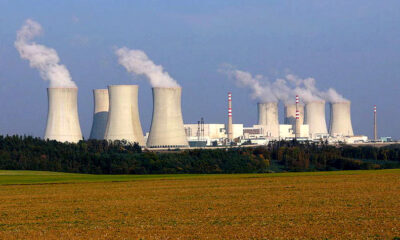Civilization
The Shakedown That Is Vermont’s New Climate Superfund Law

Long viewed as a playground for environmentalists, Vermont has jumped the climate change shark with its new Climate Superfund law. If not halted by judges who reject its dubious legal basis, this shark promises to deliver a severe blow to the state’s economy that will harm the “ordinary Vermonters” proponents claim the law will help.
Vermont took its cue from the 1980 Superfund Act
The new law is modeled after the Comprehensive Environmental Response, Compensation, and Liability Act of 1980, which created a “Superfund” to clean up hazardous waste sites. Under the original Superfund law, companies and any predecessors that dumped hazardous wastes are required to pay the actual cleanup costs for those sites.
In contrast, under the Vermont law, U.S. fossil fuel producers and their successors—companies that mined coal, produced natural gas, and extracted and refined crude oil over the 30-year period between 1995 and the end of this year, and whose carbon-equivalent emissions are estimated to have been over one billion metric tons over that period—will be required to pay into a state-administered fund for the climate “damages” caused by those fuels’ ultimate consumers. Had this same logic applied to the original Superfund law, the government would have forced chemical manufacturers to pay the cleanup costs, rather than the companies that dumped them.
Once the damages are determined, the liability from each company’s fossil fuel production will be apportioned based on the company’s share of total world emissions. To take a simple example, if between 1995 and 2024 a company refined crude oil that, when combusted, emitted one billion tons of carbon dioxide, and over the same period total world carbon dioxide emissions totaled 800 billion tons, then the company would be allocated 1/800th of the total estimated damages to Vermont.
Impossible evidentiary standards
In addition to placing liability on U.S. energy producers, rather than end users, there are two fundamental problems with the law. First, it is impossible to determine that “climate change” caused any individual weather-related events. For example, last summer, Montpelier, the state capital, was devastated by a flood, which proponents of the new Vermont law claim was caused by climate change. Yet, the town was similarly devastated almost a century ago, in 1927. Was that the result of climate change, too? In fact, a 1964 publication by the U.S. Geological Survey chronicles hundreds of New England floods between 1620 and 1955, including the 1927 one. Were these all caused by climate change, too? If not, then when did those New England floods begin to be caused by climate change?
This same cause-and-effect problem applies to other alleged damages, whether a poor maple syrup season, lousy snow at the state’s ski areas, or even a summer when the black flies are especially hungry. None can be credibly attributed to burning fossil fuels. Moreover, how will natural variability be accounted for? Will burning fossil fuels, for example, be “credited” if a maple syrup season was better than average or if Vermont ski areas had an especially good year?
An estimate with no standard to make one
Despite the impossibility of attributing specific events to burning fossil fuels, the State Treasurer’s office will be required to issue a report in January 2026 that estimates the alleged damages climate change caused the state over the 30-year period and estimates future damages. This leads to the second fundamental problem: How will the Treasurer’s office credibly estimate those damages?
Curiously, the state’s bond issuances, which the Treasurer’s office also oversees, make no mention of damages from climate change posing an economic risk to the state that could limit future repayments. Even the most recent bond issuance in September 2023, which discusses the economic risks posed by recovery from the Covid pandemic, does not mention any financial risks posed by climate change. Yet, just four months later, the Climate Superfund bill was introduced, with much fanfare about how climate change has already devastated the state.
The nonsensical estimates of climate-related damages to Vermont belie the real economic damages that will be done to the state’s economy. The first consequence will be higher energy prices. Fossil fuel producers will recoup their costs through higher prices, which sellers (e.g., gasoline stations, heating oil wholesalers, natural gas distribution companies) will recover from consumers. Unlike the presumed damages to the state from climate change, higher energy prices will have immediate and destructive impacts on the state’s economy and beyond.
Vermont as a bad example
Other states are looking hungrily at the law, hoping to enact similar legislation. But imagine if the entire country enacted similar legislation, as many environmentalists want. Last year, U.S. energy-related CO2 emissions were about 5 billion metric tons. Using the Environmental Protection Agency’s most recent SCC value, about $200/ton, the resulting “damages” are $1 trillion. Over the past 30 years, the damages would have been around $30 trillion. If, over that time, the U.S. emitted an average of about one-fourth of world CO2—it’s down to about 15% because China’s emissions have increased rapidly–then U.S. energy companies collectively would owe over $7 trillion.
No company could pay its share of that amount because it would all be bankrupt if it tried, and no companies would purchase the assets because then they would be liable. The entire scheme would soon collapse. And if fossil fuel producers actually stopped producing fossil fuels, as some environmentalists demand, the U.S. economy—and modern life as we know it—would be wrecked.
Vermont’s new law ought to be viewed for what it is: a shakedown to benefit the state’s favored constituents at the expense of the public.
This article was originally published by RealClearEnergy and made available via RealClearWire.
Jonathan Lesser is the president of Continental Economics, a senior fellow with the Discovery Institute, and an adjunct fellow with the Manhattan Institute. His report, “Green Energy and Economic Fabulism,” was recently published by the Global Warming Policy Foundation.
-

 Accountability3 days ago
Accountability3 days agoWaste of the Day: Principal Bought Lobster with School Funds
-

 Civilization12 hours ago
Civilization12 hours agoWhy Europe Shouldn’t Be Upset at Trump’s Venezuelan Actions
-

 Executive2 days ago
Executive2 days agoHow Relaxed COVID-Era Rules Fueled Minnesota’s Biggest Scam
-

 Constitution3 days ago
Constitution3 days agoTrump, Canada, and the Constitutional Problem Beneath the Bridge
-

 Christianity Today12 hours ago
Christianity Today12 hours agoSurprising Revival: Gen Z Men & Highly Educated Lead Return to Religion
-

 Civilization1 day ago
Civilization1 day agoThe End of Purple States and Competitive Districts
-

 Executive1 day ago
Executive1 day agoWaste of the Day: Can You Hear Me Now?
-

 Executive4 days ago
Executive4 days agoTwo New Books Bash Covid Failures














